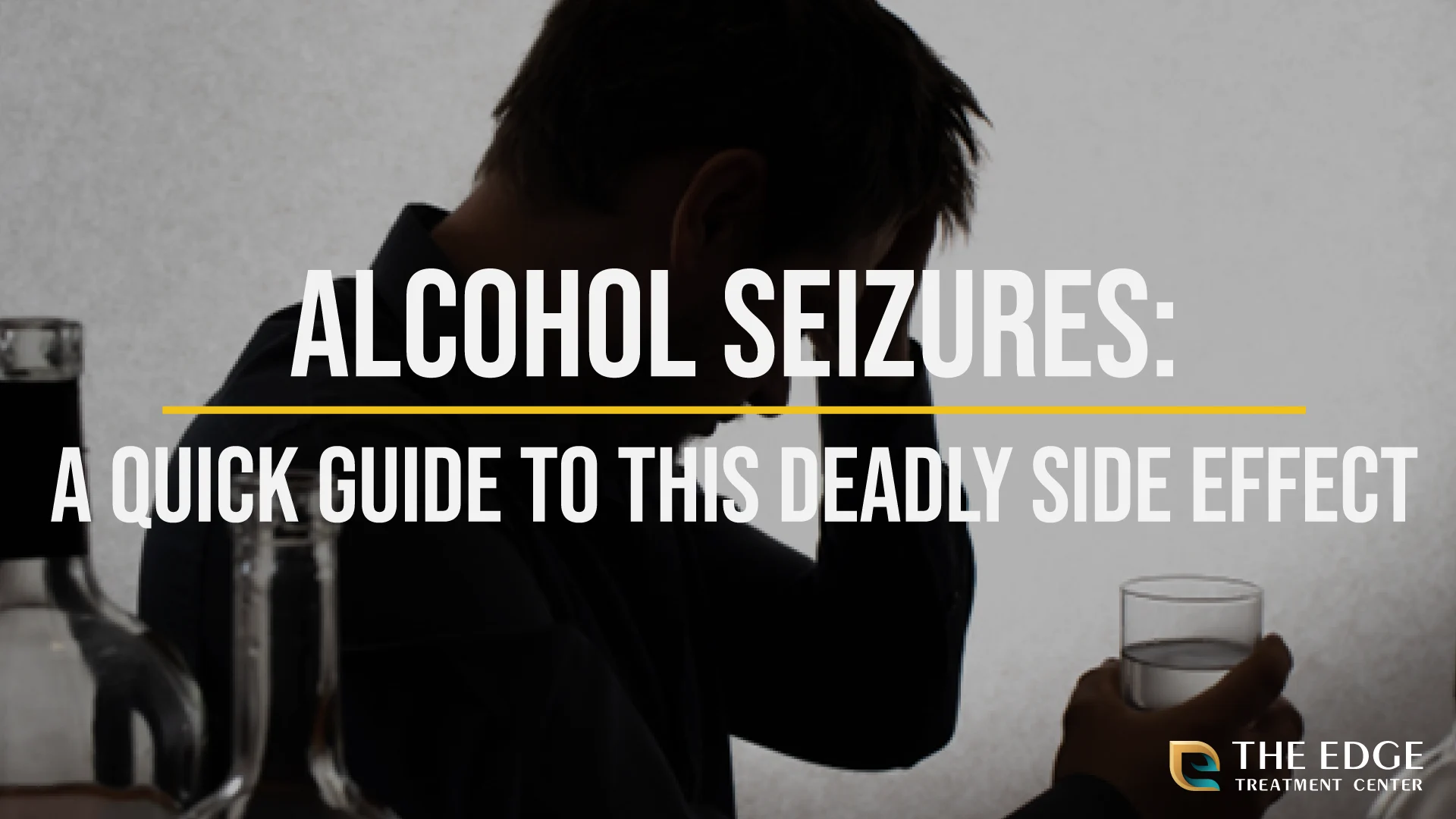Drug and Alcohol
Can Alcohol Cause Seizures?

Yes, alcohol can cause seizures—and I found out the hard way. If you're drinking heavily or worried about someone who is, this could be the wake-up call that changes everything.
Can one night of drinking cause a seizure?
Rarely, but it’s possible, especially if combined with other substances, or in people with a history of seizures or epilepsy.
How soon after quitting drinking can seizures happen?
Usually within 6 to 48 hours, but in some cases, seizures can occur up to 7 days after the last drink.
Do seizures from alcohol mean I have epilepsy?
Not necessarily. Alcohol withdrawal seizures are usually temporary. But repeated episodes or severe brain trauma can increase long-term seizure risk.
Is it safe to detox at home?
No. If you’ve been drinking heavily, detoxing without medical support is dangerous and potentially fatal.
I never thought it would happen to me.
Not the tremors, not the confusion, and definitely not the seizure. I had always brushed off the warnings. I wasn’t that kind of drinker, I told myself. I had a job. I paid my bills. I could hold it together.
But one night, after days of heavy drinking and then suddenly deciding to quit, my body betrayed me. My muscles stiffened. My vision blurred. I woke up on the floor, confused and scared. That was the day I learned, in the most terrifying way possible, that yes, alcohol can cause seizures.
I wish I’d known sooner what I’m about to share with you now.
What Kind of Seizures Can Alcohol Cause?
There are two primary ways alcohol can trigger seizures.
Alcohol Withdrawal Seizures
This is the most common cause of alcohol-related seizures. When you drink heavily and often, especially over a long period, your brain adjusts to the depressant effects of alcohol. Then, when you suddenly stop, your nervous system goes into overdrive. That’s what happened to me.
Withdrawal seizures typically occur within 6 to 48 hours after the last drink, often without any warning. They can be isolated (one seizure) or occur in clusters. Some people, like I did, may experience tonic-clonic seizures, the kind most people picture: full-body convulsions, loss of consciousness, the works.
It’s not just dangerous, it’s deadly if left untreated.
Alcohol-Induced Seizures (While Still Drinking)
Less common, but still possible. Long-term alcohol abuse can lower your brain’s seizure threshold. That means you're more likely to seize, even while you're drinking, especially if you binge or combine alcohol with certain medications or drugs.
This isn't just something that happens in the movies. I've met people in recovery who had seizures at parties, in bars, even in their sleep, without ever stopping their alcohol intake.
Why Does This Happen? A Look at the Science
When I first started trying to understand what had happened to me, I needed answers, real ones.
Here’s what I learned.
Alcohol is a central nervous system depressant. It slows down brain activity by increasing GABA, a neurotransmitter that calms the brain, and suppressing glutamate, which excites it.
Over time, your brain compensates. It produces less GABA and more glutamate to keep things balanced.
Then, when you stop drinking, that balance is gone. The brain becomes overstimulated, like a car with the gas pedal jammed to the floor.
That’s what causes withdrawal symptoms like anxiety, tremors, hallucinations, and yes, seizures.
There’s also something called the kindling effect. That’s when each withdrawal episode makes the brain more sensitive and reactive to the next one. So if you’ve quit and relapsed multiple times, your risk for severe symptoms, including seizures, actually grows with each cycle. That was true for me. I didn’t have a seizure the first or second time I tried to quit, but the third? That’s when it hit.
The damage isn’t just emotional. Your brain remembers.

We’re Here To Help You Find Your Way
Would you like more information about alcohol seizures? Reach out today.
What to Expect During Alcohol Withdrawal
One of the things I wish someone had explained to me clearly is what alcohol withdrawal actually feels like. So here’s the truth.
It doesn’t feel like a hangover. It’s way worse. Within the first 12 hours, I felt shaky, sweaty, anxious, and on edge. I couldn’t sleep. My heart wouldn’t slow down. I’d try to eat, but my stomach felt like it was twisting.
By day two, I started hallucinating. I saw flickers of shadows that weren’t there. I thought I heard someone calling my name when the house was empty. And then came the seizure.
I later learned this is pretty typical. Symptoms come in three stages:
Stage 1 (6–12 hours): Mild tremors, anxiety, nausea, restlessness, headache
Stage 2 (12–48 hours): High blood pressure, irregular heartbeat, disorientation, risk of seizures
Stage 3 (48–72+ hours): Risk of Delirium Tremens (DTs), severe agitation, hallucinations, possible death without medical intervention
This is not something to gamble with. If I had been alone, I could have died. That thought still haunts me.
Warning Signs: When to Worry About Seizures
I didn’t get much warning before my first seizure, but looking back, I did have symptoms I should’ve taken more seriously:
Shaking hands
Insomnia
Anxiety or panic attacks
Heart racing, sweating, or nausea
Hearing or seeing things that aren’t there
If you’re trying to quit drinking and experiencing any of these, don’t try to detox alone. I can’t stress this enough. Withdrawal isn’t just uncomfortable. It can kill you.
That’s not drama. That’s reality. I’ve lost friends who didn’t take it seriously.

We’ll Lead You to New Heights
Do you have more questions about alcohol seizures? Reach out.
Delirium Tremens: The Most Dangerous Form of Alcohol Withdrawal
Seizures aren’t the only extreme risk during alcohol withdrawal. There’s something even more dangerous called Delirium Tremens, or DTs.
DTs can start 48 to 96 hours after your last drink. It doesn’t happen to everyone, but when it does, it’s a medical emergency.
Symptoms of DTs Include:
Severe confusion
Sudden agitation or aggression
Hallucinations (seeing or hearing things that aren’t there)
Fever and profuse sweating
Racing heart
Seizures
Extreme tremors
If this sounds terrifying, that’s because it is. DTs can lead to cardiac arrest, respiratory failure, or coma. Without proper medical treatment, it can be fatal.
I was lucky. I didn’t develop DTs, but I’ve seen others in recovery go through it. Some made it out. Others didn’t.
This is why detox must be treated seriously. Even if you feel “fine” right now, your body may already be ticking like a time bomb.
Who Is Most at Risk?
Not everyone who drinks will have a seizure, but certain risk factors make it far more likely:
Drinking daily or heavily for weeks, months, or years
Binge drinking episodes (5+ drinks for men, 4+ for women)
History of withdrawal symptoms or seizures
Mixing alcohol with benzodiazepines, opioids, or other depressants
Poor nutrition, dehydration, or liver issues
If any of this sounds familiar, you might be more vulnerable than you think.
And if you’ve had withdrawal symptoms before, even mild ones, the next time can be worse. It usually is.

We’re Here To Help You Find Your Way
Do you need advice about alcohol seizures? Reach out today.
Can Alcohol Cause Long-Term Seizure Risk?
Sadly, yes.
I’ve met people in recovery who developed alcohol-related epilepsy, especially those who had multiple withdrawal seizures or suffered brain trauma from falls while drunk. Chronic drinking can lead to permanent brain changes that make future seizures more likely, even if you’ve stopped drinking.
Every seizure does damage. And each one raises the risk of the next.
This is why getting professional help is so important, not just for detox, but for long-term healing.
How I Found Out I Needed Help
I didn’t think I had a drinking problem. I told myself I was just blowing off steam. But the truth was, I was drinking every night, needing it to fall asleep, and spiraling emotionally.
The seizure was my wake-up call, but I wish I hadn’t waited for something so terrifying to realize I needed help.
Recovery didn’t start with rehab or treatment. It started with honesty.
I had to admit that alcohol had more control over me than I wanted to admit. And that letting go of it wasn’t going to be something I could do safely, or alone.

We’ll Lead You to New Heights
Would you like more information about alcohol seizures? Reach out today.
Detoxing Safely: Please Don’t Go Cold Turkey
The most dangerous words I ever said to myself were:
“I’ll just quit cold turkey.”
It sounds brave. It’s actually reckless, especially if you’ve been drinking heavily.
Alcohol withdrawal needs medical supervision.
At a treatment center, they monitor you around the clock, use medication to ease symptoms, and intervene if seizures or hallucinations occur. Some people also need IV fluids, anti-seizure meds, or anxiety support.
At The Edge Treatment Center, we work with people through the entire process, from finding safe detox options to outpatient treatment and long-term recovery.
Detoxing with help isn’t weakness. It’s wisdom. And it's the first step toward real freedom.
What Recovery Looks Like After a Seizure
That seizure changed my life, but in the long run, for the better.
After detox, I went through outpatient treatment, therapy, and joined a recovery community. I got to work on the things alcohol was numbing: the pain, the pressure, the stuff I didn’t want to feel.
I met others with stories like mine. Some had survived seizures. Some had barely escaped DTs. Some were there to prevent the worst from ever happening.
And I learned something wild: you don’t have to hit rock bottom to change.
The seizure was my bottom. Yours doesn’t have to be.
Today, I live a life I didn’t think was possible when I was drinking. I don’t wake up in fear anymore. I sleep. I laugh. I show up for the people I love, and for myself.
And if you’re reading this and wondering if you need help… that might be your sign.
For Family Members: What to Watch For and How to Help
If you’re reading this because you’re scared for someone you love, I’ve seen your side of this, too. And I want to say this clearly: you’re not overreacting.
Alcohol-related seizures are a real risk. And you may notice warning signs before the person drinking does.
Look for:
Drastic changes in sleep, mood, or appetite
Shaking hands or sweating in the morning
Lying or minimizing about drinking
Secluding themselves or losing interest in things they loved
Angry or defensive behavior when you bring up alcohol
What Can You Do?
Talk to them calmly, when they’re sober
Avoid blaming or judging
Focus on how their behavior affects you
Encourage them to seek help
Connect with a treatment center that can support both of you
You can’t force someone to change. But you can be the hand they reach for when they’re finally ready.
Ready to Take the First Step? We’ll Help You Through It
You don’t have to figure this out on your own. If you’re worried about alcohol and the risk of seizures, whether it’s you or someone you love, there’s support available. At The Edge Treatment Center, we guide you through every stage of recovery, from finding safe detox options to building a long-term plan that actually works. We’ll connect you with trusted resources, help you understand what’s happening, and walk beside you as you reclaim your life. The hardest part is starting, but once you do, you’ll never have to go back to where you were.

We’re Here To Help You Find Your Way
If you or a loved one is struggling with addiction, there is hope. Our team can guide you on your journey to recovery. Call us today.
Written by
The Edge Treatment Center
Reviewed by
 Jeremy Arzt
Jeremy ArztChief Clinical Officer
Drug and Alcohol
July 23, 2025
